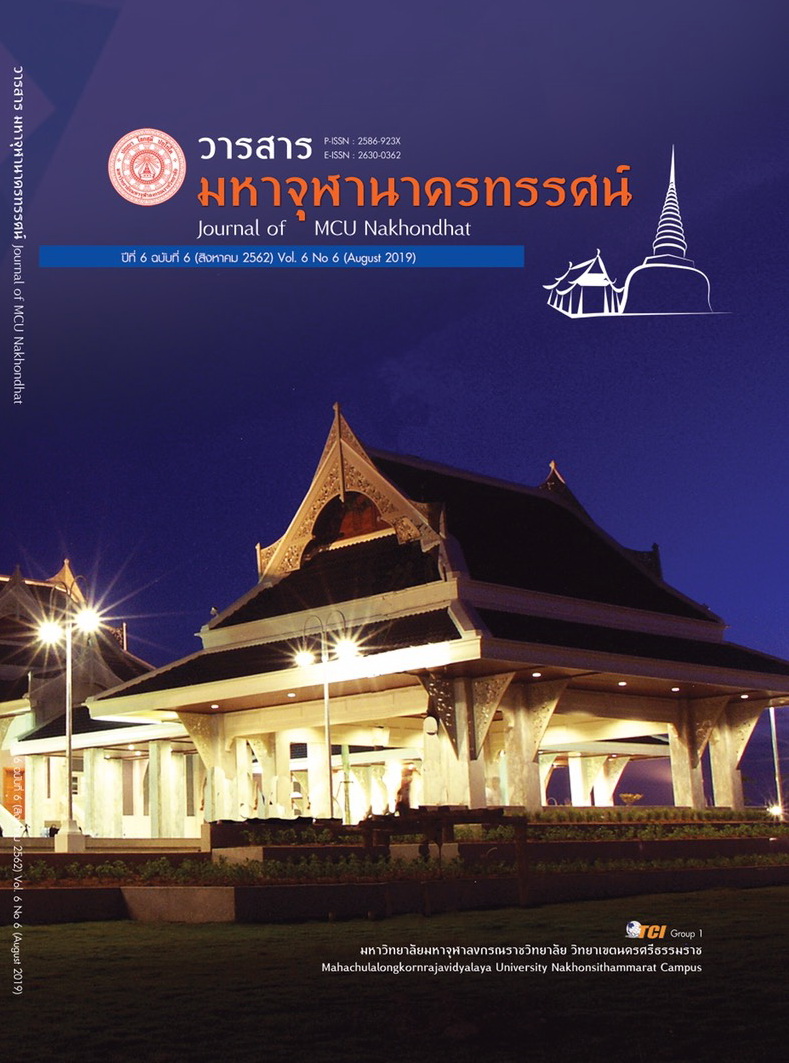BUDDHIST PROPAGATION STRATEGY BASED ON PATISAMBHIDA FOUR FOR THAI MISSIONARIES IN EUROPE
Main Article Content
Abstract
The purpose of this research is 1) to study the state of Buddhism propagation of the Thai diplomatic mission in Europe 2) to develop the strategy of propagating Buddhism according to the 4th Apostolic Principles for the Thai diplomatic mission in Europe and 3) to propose Strategies for propagating Buddhism in accordance with the 4 principles of the Apostolic Principles for the Thai diplomatic mission in Europe Is a qualitative research consisting of interviewing 15 key informants and organizing a group of 10 experts / experts to analyze data using content analysis.
The results of the study found that:
- Buddhist monks and Buddhist organizations still do not have research to evaluate Dharma propagation. To improve to suit the circumstances of the society that is living or the basis of each target audience People lack knowledge and understanding of moral standards. Thai youths are distant from Buddhism. Most people do not know how to propagate the activities of Thai monks. This kind of work is considered proactive propagation and has been well received by people in Europe.
- The result of the development of the strategy of propagating Buddhism in accordance with the 4 principles of the Apostolic Principles for the Thai diplomatic mission in Europe There are three mechanisms of strategy: vision, mission, and objectives and strategies. 4 are: 1) the strategy of identity transformation 2) The strategy of the Royal Warhammer 3) The strategy of the Nirutiphat 4) The strategy of the revolution
- Strategies for propagating Buddhism in accordance with the 4 principles of the Apostolic Principles for Thai diplomats in Europe, consisting of 1) Vision, which is propagating Buddhism with wisdom, enlightened in the text, understanding the Dharma, mastering the language, solving problems with timely thinking. "2) The mission is (1) to propagate Buddhism to be stable in Europe (2) to develop the dharma diplomacy in foreign countries to be a master of wisdom in the skills in the understanding of theology 3) Objective (1) Foreign missionaries have the ability to propagate Buddhism. (2) Foreign missionaries have creative communication skills. 4) Strategy (Strategy) is a strategy to create intelligence to be masterful. The strategy specializes in principles. strategy to use words to clarify reasons and strategies for creating unskilled skill
Article Details
How to Cite
ปุญฺญธโช (เทาศิริ) พ. (2019). BUDDHIST PROPAGATION STRATEGY BASED ON PATISAMBHIDA FOUR FOR THAI MISSIONARIES IN EUROPE. Journal of MCU Nakhondhat, 6(6), 3154–3171. retrieved from https://so03.tci-thaijo.org/index.php/JMND/article/view/201927
Section
Research Articles
References
บัญชายุทธ นาคมุจลินท์. (2556). วิเคราะห์การบริหารองค์กรในการเผยแผ่ พระพุทธศาสนาของศูนย์การเผยแผ่พระพุทธศาสนาประจำจังหวัดอุทัยธานี. ใน ดุษฎีนิพนธ์ สาขาวิชาพระพุทธศาสนา. มหาวิทยาลัยมหาจุฬาลงกรณราชวิทยาลัย.
พระครูใบฎีกาอภิชาติ ธมฺมสุทฺโธ. (2559). แนวโน้มการบริหารกิจการคณะสงฆ์ ในทศวรรษหน้า. พระนครศรีอยุธยา: มหาวิทยาลัยมหาจุฬาลงกรณราชวิทยาลัย.
พระครูอุทัยกิจจารักษ์ (สุรางค์ สุจิณฺโณ). (2557). รูปแบบการบริหารจัดการการเผยแผ่พระพุทธศาสนาขององค์กรปกครองคณะสงฆ์ ภาค 2. ใน ดุษฎีนิพนธ์ สาขาการจัดการเชิงพุทธ. มหาวิทยาลัยมหาจุฬาลงกรณราชวิทยาลัย.
พระธรรมปิฎก (ป.อ. ปยุตฺโต). (2543). งานพระธรรมทูตในพระธรรมทูตในต่างประเทศ. กรุงเทพมหานคร: โรงพิมพ์มหาจุฬาลงกรณราชวิทยาลัย.
พระใบฎีกาสุพจน์ ตปสีโล. (2552). ขบวนการพุทธใหม่ในประเทศไทย. พระนครศรีอยุธยา: มหาวิทยาลัยมหาจุฬาลงกรณราชวิทยาลัย.
มหาจุฬาลงกรณราชวิทยาลัย. (2539). พระไตรปิฎกภาษาไทย ฉบับมหาจุฬาลงกรณราชวิทยาลัย. กรุงเทพมหานคร: มหาจุฬาลงกรณราชวิทยาลัย.
พระครูใบฎีกาอภิชาติ ธมฺมสุทฺโธ. (2559). แนวโน้มการบริหารกิจการคณะสงฆ์ ในทศวรรษหน้า. พระนครศรีอยุธยา: มหาวิทยาลัยมหาจุฬาลงกรณราชวิทยาลัย.
พระครูอุทัยกิจจารักษ์ (สุรางค์ สุจิณฺโณ). (2557). รูปแบบการบริหารจัดการการเผยแผ่พระพุทธศาสนาขององค์กรปกครองคณะสงฆ์ ภาค 2. ใน ดุษฎีนิพนธ์ สาขาการจัดการเชิงพุทธ. มหาวิทยาลัยมหาจุฬาลงกรณราชวิทยาลัย.
พระธรรมปิฎก (ป.อ. ปยุตฺโต). (2543). งานพระธรรมทูตในพระธรรมทูตในต่างประเทศ. กรุงเทพมหานคร: โรงพิมพ์มหาจุฬาลงกรณราชวิทยาลัย.
พระใบฎีกาสุพจน์ ตปสีโล. (2552). ขบวนการพุทธใหม่ในประเทศไทย. พระนครศรีอยุธยา: มหาวิทยาลัยมหาจุฬาลงกรณราชวิทยาลัย.
มหาจุฬาลงกรณราชวิทยาลัย. (2539). พระไตรปิฎกภาษาไทย ฉบับมหาจุฬาลงกรณราชวิทยาลัย. กรุงเทพมหานคร: มหาจุฬาลงกรณราชวิทยาลัย.


